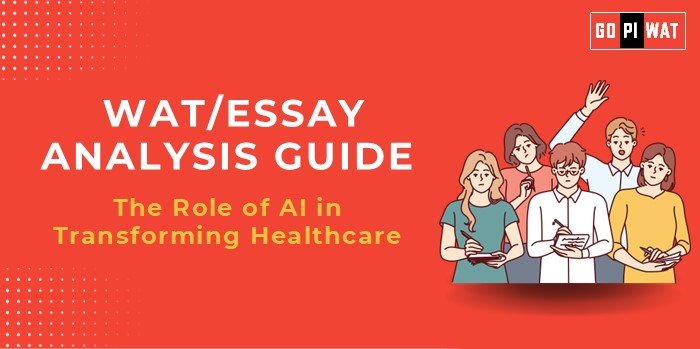📋 WAT/Essay Analysis Guide: The Role of AI in Transforming Healthcare
🌐 Understanding the Topic’s Importance
AI’s integration into healthcare is a critical topic, reflecting broader themes of technological innovation, ethical considerations, and economic implications. Its relevance to B-school curricula lies in its potential to disrupt traditional healthcare models and create new business opportunities.
📝 Effective Planning and Writing
- Time Allocation:
- Planning: 5 minutes
- Writing: 20 minutes
- Review: 5 minutes
- Introduction Techniques:
- Contrast Approach: “While AI tools have enhanced diagnostic accuracy to 95% in specific cases, the accessibility of these advancements remains skewed, favoring developed nations over low-income regions.”
- Solution-Oriented: “AI can address critical issues like staff shortages and diagnostic inefficiencies. However, ensuring inclusivity and ethical deployment is imperative to maximize its global impact.”
📊 Structuring the Essay Body
- Achievements:
- Diagnostic Advancements: AI tools like Google’s DeepMind have been instrumental in detecting eye diseases with human-level accuracy.
- Operational Efficiency: Predictive AI analytics have cut emergency room wait times by up to 25% in pilot programs in Europe.
- Cost Savings: Automation in administrative processes has reduced operational costs by an estimated $18 billion annually in the US healthcare sector.
- Challenges:
- Ethical Concerns: Biased datasets can result in disparities in patient outcomes, as seen in studies where minority groups received less accurate predictions.
- Implementation Barriers: High costs and lack of infrastructure prevent widespread adoption, particularly in rural and underfunded areas.
- Future Outlook:
- Telemedicine Expansion: AI can bridge healthcare gaps in remote regions, especially with the integration of 5G technologies.
- Personalized Medicine: Using AI-driven genetic data analysis, treatments tailored to individual needs are becoming feasible.
- Collaboration Potential: Governments and private entities can form alliances to create affordable AI-driven solutions.
💡 Concluding Effectively
Balanced Perspective: “AI’s transformative potential in healthcare is evident through enhanced diagnostics and cost reductions. However, addressing challenges like equitable access and ethical implementation will determine its success.”
Future-Oriented: “The global healthcare sector stands at the cusp of an AI revolution. Ensuring ethical integration and accessibility will solidify AI’s role as a cornerstone of modern medicine.”
✨ Recommendations for Sustainable Progress
- Enhance Data Governance: Develop stringent frameworks to protect patient data and ensure privacy.
- Promote Affordable Access: Subsidize AI technologies for low-income and rural areas.
- Invest in Workforce Training: Equip healthcare professionals with AI literacy to improve implementation and efficiency.
📄 Sample Short Essays
- Balanced Perspective: “AI in healthcare has significantly improved diagnostic accuracy and operational efficiency, as seen in its application in disease detection and cost savings. However, challenges like data privacy and algorithmic bias highlight the need for careful integration. Bridging these gaps will ensure that AI serves as an inclusive tool for global healthcare transformation.”
- Solution-Oriented: “AI addresses critical healthcare challenges by enhancing diagnostics and personalizing treatments. For example, AI algorithms in oncology detect early-stage cancers with unprecedented accuracy. To maximize its impact, investments in infrastructure and regulatory frameworks are essential, ensuring equitable access across regions.”
- Global Comparison: “The United States and the United Kingdom are leaders in integrating AI into healthcare, with initiatives like AI-driven clinical trials and diagnostics in public healthcare systems. Developing nations can replicate these models by focusing on telemedicine and forming public-private partnerships to scale adoption effectively.”


